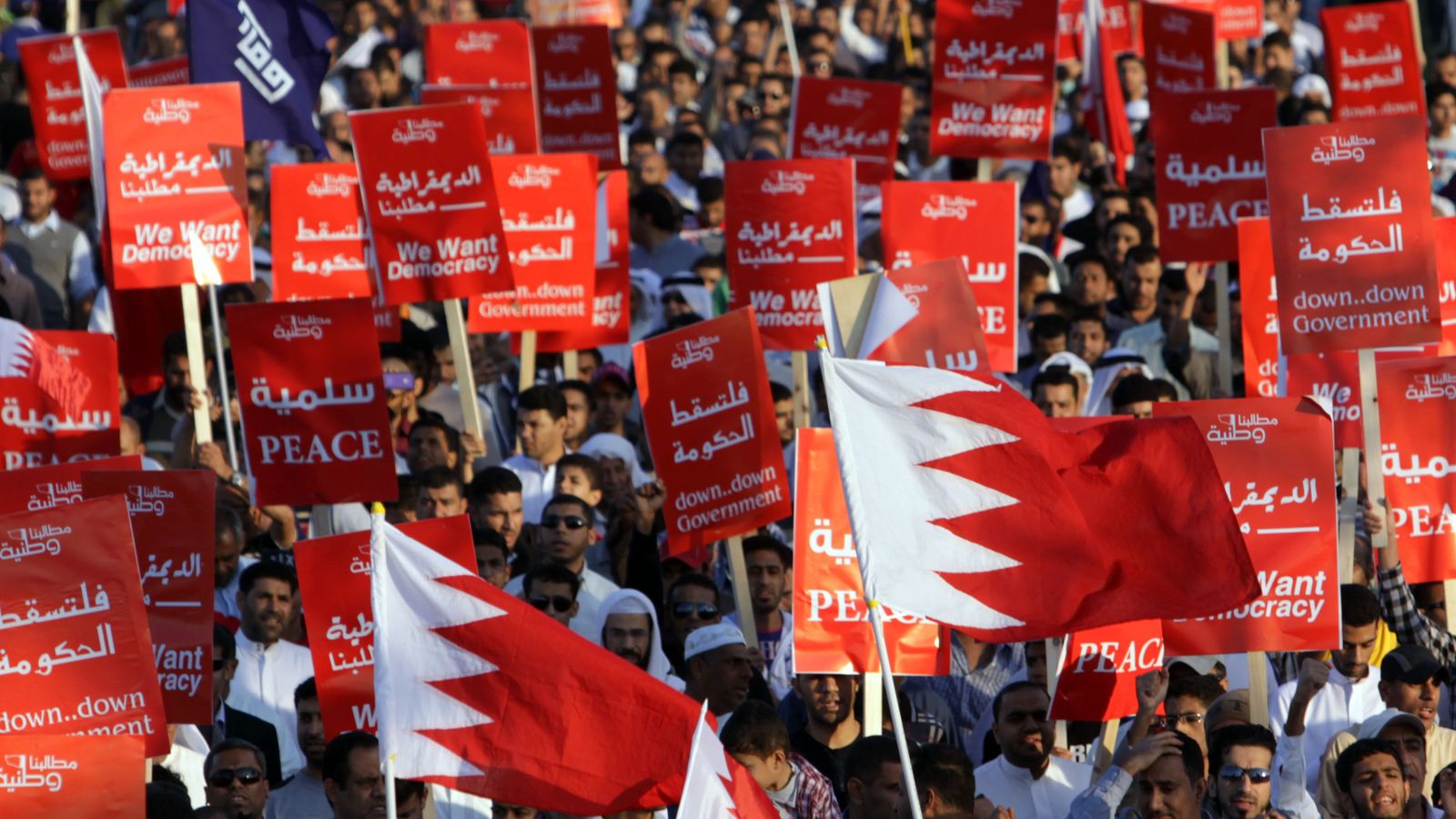Campaigners say Bahrain is abusing the Interpol red notice system to track down and extradite dissidents from abroad.
Sayed Ahmed Alwadaei, the director of advocacy for an NGO called the Bahrain Institute for Human Rights and Democracy, blames flaws in the system for the arrest and extradition of several dissidents who have fled the kingdom.
“Although I left and escaped the country, living in London, I don’t feel very safe,” he said.
“There is a real threat. There is a true nightmare I would think of before I have to make any move, before I travel to anywhere and that’s because of that Interpol red notice.”
Click to subscribe to Dirty Work: The Misuse of Interpol Red Notices
The Sky News Dirty Work podcast is investigating the global police information system, operated by Interpol, which enables police forces to flag their most wanted persons at international borders around the world.
It is designed to assist in the apprehension of people suspected of serious crimes, but has also been used by authoritarian states to target political opponents.
Ukraine war: The West risks tipping the conflict in Russia’s favour – here’s why
Donald Trump says indictment is ‘great badge of honour’ – and another one will win him the election
UK Scout leader reveals Jamboree chaos amid South Korea heatwave – with ‘ambulances everywhere’
In some cases, those people are detained, imprisoned, and extradited, with devastating consequences.
Bahrain violently cracked down on protesters during the 2011 Arab Spring, arresting thousands and charging many under a repressive law that conflates actions considered contrary to the interests of the state with terrorism. It has since banned all independent media and dissolved all significant opposition groups.
Now it is suspected of abusing the red notice system to track down dissidents abroad.
The most prominent case was that of footballer Hakeem al Araibi, a Bahraini refugee who was tortured in his home country before fleeing to Australia, where he is a permanent resident.
He spent months wrongly imprisoned in Thailand in 2018 after he was arrested on an invalid red notice issued by Bahrain for his extradition.
Sayed campaigned on Hakeem’s behalf and said that – despite the high-profile case – more red notice arrests have been made.
Ahmed Jaafar Mohammed Ali was arrested in Serbia on a red notice in 2021 and later extradited to Bahrain, where he is serving a life sentence.
In a voice note from prison, he said: “Because of Interpol my life is destroyed, I am serving more than 60 years in the jail with very bad situation.”
Ahmed is a labour activist who took part in protests in Bahrain in 2007 which saw him detained and tortured. His testimony was featured in a Human Rights Watch report on the resumption of torture in Bahrain.
On his release he fled the country. He was convicted in absentia on terrorism charges in 2013, despite the incident having occurred after he left the country.
“The others got death sentences. And here you go. You get a life sentence in Bahrain, like you get a parking ticket,” Sayed said.
The mass trial was condemned by the United Nations.
In 2015, Bahrain stripped Ahmed of his citizenship and issued a red notice for him.
Following his arrest in Serbia, Ahmed was extradited to Bahrain on a private plane in January 2022 despite an interim order against it from the European Court of Human Rights.
“This is one of those prisons in Bahrain which is not a joke, it’s one of the most notorious of prisons,” Sayed said.
“You could be subject to assault, to torture, all sorts of abuse. And regrettably, Ahmed is living all of this.”
The government of Bahrain did not respond to a request for comment.
Interpol set up a specialised task force in 2016 to check all requests to ensure they comply with its rules. But Sky News has learned abusive notices are still slipping through the net.
The organisation said Ahmed’s red notice was issued before the creation of the taskforce. However it also said since 2018 the body also began scrutinising existing notices. Despite Bahrain’s history of abusing the notice system and his mention by name in reports by human rights bodies, Ahmed Jaafar’s notice was not removed.
Jurgen Stock, secretary general of Interpol, told the Dirty Work podcast: “Interpol’s mandate is to ensure the widest possible mutual support between criminal police organisations all around the world, between countries who have very different legal systems, between countries who very often have a difficult political relation and even between countries in conflict sometimes.
“So it’s a sensitive work that we are doing in the interest of global security to protect people all around the world against ordinary law crime.”
Click to subscribe to the Sky News Daily wherever you get your podcasts
Sayed worries that there will be more abuses of the Interpol red notice system by Bahrain if harder action isn’t taken. His calls are being backed by other groups including Fair Trials and Human Rights Watch.
He said: “Unless someone who the from the top management of the Interpol is going to be held into account, we are going to see more of these abuses.”








